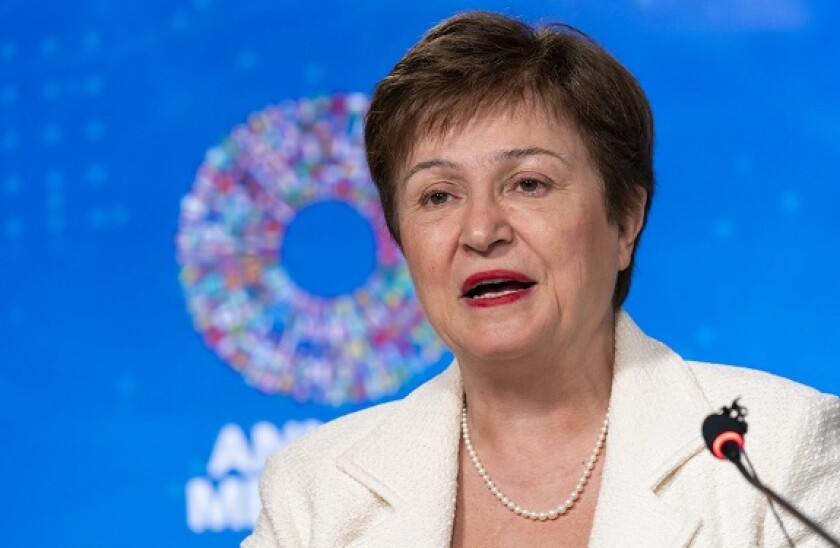The overwhelming majority of the International Monetary Fund’s Covid-19 loans have come with advice that poor countries hit hard by the economic fallout from the pandemic should adopt tough new austerity measures, according to development lobbyists.
Since the pandemic was declared in March, 76 out of 91 IMF loans negotiated with 81 countries — or 84% — push for belt tightening that could result in deep cuts to public healthcare systems and social protection such as benefits, charity group Oxfam said.
Ana Arendar, the charity’s head of inequality policy, said this was “exactly the wrong instruction” for the IMF to be giving poor countries. “It is nothing short of unacceptable that the IMF is using its power to make life harder for people already struggling to survive,” she said.
“Millions more people are likely to be left without healthcare or income support while they search for work, thwarting any hope of a sustainable recovery.”
She highlighted Ecuador where the government was advised by the IMF to backtrack on increases in healthcare spending and stop cash transfers to people unable to work. A recently agreed $6.5bn loan includes cuts to fuel subsidies.
Philip Mader, research fellow at the Institute of Development Studies, said Ecuador had been negotiating with the IMF since 2017, which he said had led to a “substantial” reduction in public investment, including reducing healthcare investment by two thirds.
“The consequences of this have been devastating for the country’s response to the pandemic,” he told GlobalMarkets. “I would have hoped to see the IMF backtracking on that, but it seems the new financial aid will still be predicated on fiscal consolidation and austerity.”
‘Spend what you need’
Oxfam said 14 countries including Barbados, El Salvador, Lesotho and Tunisia were likely to freeze or cut public sector wages and jobs, which could mean lower quality of healthcare and fewer nurses, doctors and community workers in countries already short of healthcare staff.
Mader said Latin American states that lacked social institutions to let people shelter and forego weeks of wages had much worse infection and death rates. “Countries need to have the public capacity to prevent poverty from driving people out to put themselves and others at risk in order to keep themselves fed and sheltered,” he said.
Nine countries including Angola, Nigeria and Malawi are likely to introduce or increase the collection of VAT, which Oxfam said applied to everyday products such as food, clothing and household supplies whose higher costs would fall disproportionately on poor people.
Arendar urged the fund not to repeat the mistakes it made in the aftermath of the 2008 financial crisis. “Ordinary people paid the price for austerity measures,” she said.
Mader said the global consensus was for borrowing, stimulus and rescue now and worrying about paying later. “The IMF and the rest of the IFI community have to think about what they want their role to be,” he said. “If they want to be a global social good, they should look beyond investors’ narrow risk aversion. That may mean that some loans they make won’t, and shouldn’t, be repaid.”
Reza Baqir, Governor of the State Bank of Pakistan, told GlobalMarkets that the IMF had to rethink the balance between the adjustment and finance. "This is a unique crisis. The last global financial crisis was unprecedented but this is very, very different. I’m looking forward to the IMF looking at its own tool kit and how it wants to help countries out of the crisis. I’m expecting much more in terms of how we design programmes, the size of programmes, what constitutes exceptional access. All these are up for grabs," said Baqir, a former division chief at the IMF
However, neither body is accusing the IMF of imposing conditions as it did in previous crises. The IMF said it was currently providing emergency financing with a strong focus on immediate fiscal support and no conditionality. In fact IMF chief Kristalina Georgieva has said countries should spend what they can "but keep the receipts". “Our message has been clear — spend what you need to save lives and livelihoods,” said spokesman Gerry Rice.
However, he said that once pandemic had been defeated, many countries would have higher debts and lower revenues and would need to put their finances back on track.
Rice said that governments should prioritise boosting revenues through progressive tax measures that focused on those who could afford to pay, cracking down on loopholes and tax evasion, and reprioritising spending and making it more efficient to “get more bang for their buck”.
